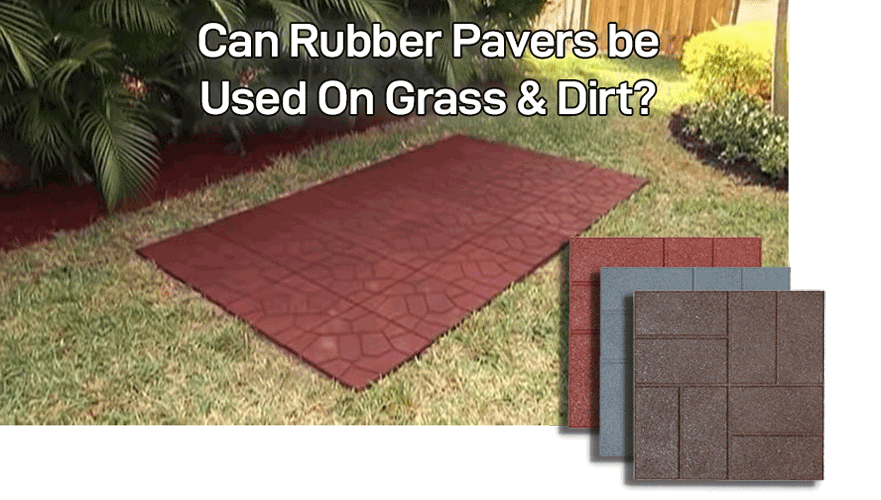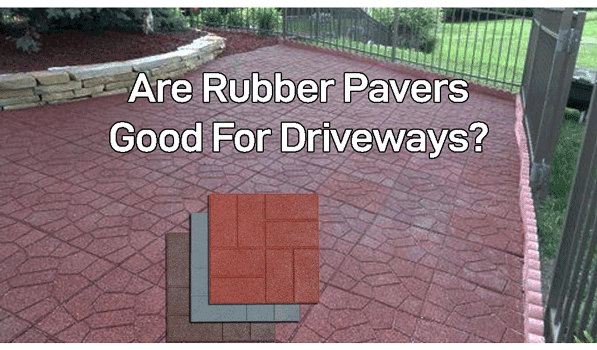
Can Rubber Pavers Be Used on Grass or Dirt?

Rubberific Red Pavers Installed over Grass
When considering the design of any property, residential or commercial, walkways should be of consideration. Rubber pavers are an environmentally conscious and affordable portable walkway option that makes going from one point on a property to another a joy. When thinking about using pavers, people have a common question of whether Rubber Pavers can be directly used on earth or not.
Rubber Pavers can be installed on grass or dirt, and they are simple to install. Place them over any existing grass or dirt to create a walkway between any two points in a property and even indoors. Recycled Rubber Pavers are perfect solution for any outdoor living areas.
In this article, we will be discussing some information about rubber pavers, including the benefits of using rubber over other materials.
What Are Rubber Pavers?
Rubber pavers are popular for a number of reasons. One of the main benefits of rubber pavers is their durability. Rubber is a highly resistant material that is able to withstand heavy foot traffic and the effects of the weather, including sun, rain, and extreme temperatures. This makes rubber pavers an ideal choice for use in high-traffic areas and for outdoor applications.
Rubber pavers are also slip-resistant, which makes them safer to walk on, particularly in wet or slippery conditions. They are also easy to clean and maintain, as they do not absorb moisture and are resistant to mold and mildew.
In addition to their practical benefits, rubber pavers are also popular because they are environmentally friendly. They are made from recycled rubber tires, which helps to reduce waste and the environmental impact of tire production. Rubber pavers are also easy to install, which makes them a cost-effective and convenient choice for a wide range of projects.
Overall, rubber pavers are a popular choice for outdoor flooring because of their durability, slip-resistance, easy maintenance, and environmental benefits. They can be used in a variety of applications, including patios, walkways, playgrounds, and more.
Are Rubber Pavers Safe to Use?
Rubber pavers can improve walkway safety in a number of ways. One of the main benefits of rubber pavers is their slip-resistant surface. Rubber has a naturally grippy surface that provides good traction, even when wet or icy. This can help to reduce the risk of slips and falls, particularly in wet or slippery conditions.
In addition to their slip-resistant surface, rubber pavers also have a soft, forgiving surface that can help to cushion falls. This can be particularly beneficial for children and older adults, who may be more prone to falls.
Rubber pavers are also easy to install and maintain, which can contribute to their overall safety. They can be laid quickly and easily, and they do not require any special tools or equipment. They are also resistant to mold and mildew, which can help to reduce the risk of tripping or falling due to slippery or uneven surfaces.
Overall, rubber pavers are a safe and effective choice for walkways and other outdoor surfaces, thanks to their slip-resistant surface, cushioned fall protection, and easy installation and maintenance.
Check out if Rubber Pavers are a good solution for your driveway

Are Rubber Pavers Good for Driveways?
Recycled pavers have gained traction as an alternative to concrete. Specifically, more people prefer installing rubber pavers for walkway surface and outdoor living spaces. For that reason, you might be wondering if rubber pavers are good for driveways.
Rubber Patio Pavers the Environmentally Responsible Product
When buying any product in this day and age, its impact on the environment is often of significant concern to the discerning customer. Luckily, rubber pavers are among the most eco-friendly products you can buy. Rubber pavers are usually made with repurposed Rubber that originates from discarded tires, making it a dream for eco-friends.
Instead of clogging up landfills, Rubber is recycled and crafted into lovely pavers of all shapes and designs. Hundreds of millions of tires are discarded annually, but rubber pavers help give the Rubber a new lease on life as your walkways and flooring.
Pavers are Strong and Flexible
Pavers are subject to high amounts of foot traffic, so naturally, you want to make sure you choose a material that holds up well to ordinary wear and tear. Not only that, but you want your pavers to last a long time, right? Look no further because rubber pavers are resistant to cracking and chipping, not to mention highly resistant to hazardous weather.
Water does not erode Rubber or affect its structural integrity as a walkway, and nor does it affect the appearance of your carefully chosen design aesthetic.
If a rubber tile does happen to become damaged for any reason, replacing it is as simple as peeling the tile up and putting a new one in place. Due to the incredible structural resilience of Rubber, this should not be a common occurrence at all. Generally, it would take an extraordinary amount of force to do damage to rubber tiles. This makes them ideal for laying and forgetting about with no extra hassle involved.
Maintenance on rubber tiles, you will be happy to hear, is very minimal. While rubber pavers tend to fade in direct sunlight, they do not require any special cleaning other than a hose off or wipe-down. With a little care, rubber pavers can serve as your walkway or flooring for many years to come.
Rubber Paver Options
Rubber Pavers on Bare Earth
Pavers are often used on hard surfaces such as flooring, however are perfectly capable of being applied to dirt and grass. Clear the desired area of debris and roughly level it, and put your tile down - it is as simple as that. Rubber pavers are desirable because you can use them both permanently using polyurethane adhesive and temporarily on any bare earth surface.
While other materials may require some special installation or preparation, rubber is quick and painless to apply, letting you get back to the things that matter most.
Rubber vs. Other Paver Materials
Rubber provides similar properties to other garden pavers, but with a few advantages. Stone is very strong and resistant to the elements, for example, but does not have the spongy, no-slip protection of rubber. Rubber pavers can come in styles that mimic stone, brick, and other materials, too.
Many variants of stone that are not slippery, some variants, like marble, actually produce more unsafe walkways than rubber. If you want to be absolutely certain you are doing everything you can to make a walkway a no-slip zone; rubber is your best bet.
While stone and brick produce sound when walked or ran on, rubber actually absorbs sound. This can be a key buying decision if you are buying a flooring material with kids, guests, customers, or noise-sensitive passerby in mind.
Stone and brick wear away over time due to inclement weather and natural erosion, which cannot be completely prevented. In contrast, rubber does not erode from the elements and resists wear and tear better than stone and brick.
Last but not least, stone and brick pavers require more of an installation process than rubber, which can be as simple as being laid down. The former materials are much heavier than the latter, meaning anybody can easily and quickly install or replace rubber pavers.
Final Thoughts
Overall, rubber pavers are a durable, slip-resistant, and easy-to-maintain product that can be used in a variety of outdoor applications. They are an attractive choice for those looking for a sustainable and practical flooring solution.
With shock-absorbing and slip-resistant properties, impressive endurance, and very lightweight, pavers are ideal for use on any kind of ground, be it flooring, dirt, or grass. All you need is a level area, and you are good to go.
.


